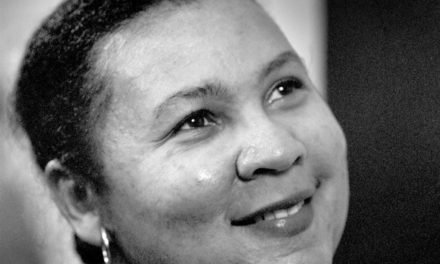
As a Black executive, it was harder for me to advance in corporate America than my white peers. I have 30 years of practical experience climbing the corporate ladder, and it was not easy to rise. I had to embrace and learn how to be comfortable being uncomfortable. I often felt isolated and excluded in executive talent decisions at a higher level. To quote one of my white peers, “If you’re not in the meeting, you’re not in the deal.” Even as the Head of Diversity and Inclusion, I, let alone any other people of color, was barely involved in any of the talent and succession meetings or plans. So how was I supposed to make the impact that I wanted, let alone be seen as an equal in corporate America?
I believe I rose as high as I did up the corporate ladder, primarily as a result of my being vigilant in taking control of my career, relentlessly delivering results, holding others accountable, and adhering to my values.
I believe I rose as high as I did up the corporate ladder, primarily a result of my being vigilant in taking control of my career, relentlessly delivering results, holding others accountable, and adhering to my values. Click To TweetWe hear it called unconscious bias, but in most cases, I witnessed intentional, conscious bias. I observed companies present a delusional front of “diversity” in the virtual company store window. Yet, if one were to take a closer look inside the building, there were little to no POC represented on the executive management “shelf.” These companies place diverse pictures on their websites, recruiting brochures, and invite diverse faces to attend high profile events. The person attending feels flattered to be invited and to attend the event with senior ranking executives receiving the proverbial pacifying “pat on the head.” I call this “table candy” because it looks sweet but offers a sour reality. These companies do not have robust diversity and inclusion succession, recruiting, and retention plans for acquiring, developing, and retaining historically marginalized employees.
I call this 'table candy' because it looks sweet but offers a sour reality. These companies do not have robust diversity and inclusion succession, recruiting, and retention plans for acquiring, developing, and retaining… Click To TweetPeople of color must be vigilant, not vulnerable with our careers. We must continue to take our careers into our own hands, maximize our talent, value proposition, and growth opportunities. To quote my younger sibling, “Stay ready, so you don’t have to get ready“ for the next opportunity.
I spent 30 years in a Fortune 500 company with a highly recognized global brand, serving as Director of North America Manufacturing and Chief Diversity and Inclusion Officer. During my tenure, I was a key part of the manufacturing leadership team that contributed to the company’s earnings rise from -38M to +1B. To become an executive at this company, I had to be vigilant about my career, deliberately practicing extreme ownership for my development and career growth. Throughout my career, I chose to pay it forward and mentored or coached hundreds of people from diverse backgrounds on how to navigate their careers effectively. I also personally witnessed several talented and qualified peers’ careers stall, placing too much trust in the fractured systems of succession planning that lack accountability for diversity, equity, and inclusion.
While writing this article, I attended a meeting with my board of directors (4 personal friends) that are or were Black senior executives at one time. During our monthly dinner meetings, we often discuss some of the challenges we face as Black men regarding career constraints and progression. These discussions produced gems of action that I felt called to share with other Black folks and people of color with the intent to help them be successful—thrive, not just survive—in corporate America. These tools can help POC build bridges to cross career roadblocks to professional growth and opportunities. There is truth in the statement, “ungoverned career vulnerability gets little reward.”
Learn to say NO! It is your right as a human being. No to opportunity. No to disparate treatment. No to disrespect. Sometimes a little discomfort prevents a lot of pain. Click To TweetSo, how do we move beyond vulnerability and model vigilance in our careers?
- Avoid the disease to please. What you accept, you won’t, can’t, and will not change. With the explosion of social media, we live in a world of likes. ‘Likes’ don’t last long, but respect and integrity do. When leading teams, I would always ask myself, “Are you getting what you expect or expecting what you get?” Demand respect and make sure you get it.
- Know your value; when you undervalue what you do, the world will undervalue who you are. – Oprah Winfrey. I am a world-renowned keynote speaker and have shared the stage with the top speakers in the world. I once spoke at the same venue with Simon Sinek. The audience of 2,000+ rated me the highest speaker. Simon receives hundreds of thousands for an event. I repeatedly spoke for free, and I did not charge for this event. The next year, I requested a ticket to attend and was declined. They devalued me until they needed an influential keynote two years later when attendance fell at their event. They called again, looking for the discount. I wasn’t so free the next time. I still speak for free sometimes, but that is after I send an invoice with my asking price to document my value—AND I document that I offered a discount on record.
- Align your actions with your aspirations. Do your actions drive your ambitions? I remember as a child walking into McDonald’s with my mother and looking at the manager sitting in her office; I told my mother that was what I wanted to do — I wanted to be a manager. At the time, my grades weren’t stellar, and she used the opportunity to make a point. She said, “Son, it takes a different level of commitment if you are going to wear the name on your desk than it does if you want to wear it on your chest.”
- Ground yourself in your strengths and know your weaknesses. I had to be willing to work on my weaknesses. Don’t be afraid not to be the smartest person in the room. Don’t surround yourself with people just like yourself. Embrace the idea of getting it done through others. My friend Mike who is the most versatile leader I know, pressed hard on this point, as it was a catalyst in his career. Invest in you — it’s like banking: if you don’t invest anything in, you can’t withdraw anything out. I had a gap and knew it. I took personal steps to invest in closing the gap. Truthfully, I did not get my MBA to get a job — I got it to stop them from giving the job to someone else just because they had an MBA.
- Don’t wait to be evaluated; present the facts. First, provide value by delivering results. Then, document, document, document. Don’t let executive amnesia derail your career. When you get an email on an excellent job, file it. When you get recognized for any performance — good or bad — document and file it. It served me well to document the facts and review quarterly with my manager. Limit subjectivity. Document everything that matters for alignment. A documented track record of success leads to the next opportunity.
- Trust yourself. I once almost turned down the best opportunity of my career. I was offered an assignment to turn around a struggling organization. My original thought was the assignment is too difficult. My mother called and advised me to accept the job because she was confident that I had developed the skills and leadership to achieve the task. She asked me a profound question. She asked, “If a bird lands on a branch, does the bird trust the branch or its wings? We trust our wings, ourselves. Be the change agent the organization needs.”
- Learn to say “NO.” Be comfortable being uncomfortable. Prioritize opportunities to seize the best opportunity. Know what good looks like. All money is not good money. All opportunities are not good opportunities. Learn to say NO! It is your right as a human being. “No” to opportunity. “No” to disparate treatment. “No” to disrespect. Sometimes a little discomfort prevents a lot of pain.
- Eliminate your sticky floor; it helps the glass ceiling hold you back. What is “the sticky floor?” These are the negative things you do or say to yourself that limit who you are and are holding you back. I know from my experience there is a glass ceiling. I am vigilant about eliminating restraints and excuses, especially ones that I inflict on myself. I make it a point to be prompt with work, model executive presence (my way), and always being a person of integrity.
- Pick your leaders. If you can’t pick your leader, then learn how to manage up. Steal the best from your past leaders. Don’t sign on to work for leaders that have a track record of not developing talent.
- Don’t let others determine your capability. Build your career in your truth. You can’t fake reality, so don’t be a knockoff — knockoffs get knocked off. Master your craft, benchmark others, but first, master your own skills. This will enhance your value beyond bias and politics. I focused on being needed based on my value, rather than just being liked. You must be so vigilant and skilled at what you do that you and your craft/contributions cannot be disregarded or dismissed. Be real about what it takes and relentless in your executions. I thrived off negativity, using it as rocket fuel to propel my career. One of my most useful tools was the book The Four Agreements by Miguel Ruiz. Be impeccable with your words. Don’t take it personally. Don’t make assumptions. Always be at your best.
- Surround yourself with people who will help you grow. Mentors, real mirrors, cup fillers. Surround yourself with people that will keep you grounded for growth. People that will not let you be a prisoner of your success.
- Don’t skip steps — stick to your plan. Change is the only constant in life. Excellence requires embracing failure for growth. Like children, adults don’t like to eat their PEAS. Plan, Execute, Assess to adjust, and S: the best plan you will ever execute is the one that you commit and stick too! My drive was always to be successful in my current job, which has and will always be my priority. I advise you to worry more about delivering tangible results than the next promotion.
- Have extreme personal ownership of your career. “In the absence of ownership comes blame.” Success is not just about the results. It is about your actions — your job depends on it. Don’t be incognito. Know who you are. No one will take care of you like you will. Early in my career, I found myself minimizing myself so that others could feel maximized. I was also passed over when the best opportunities were presented until I owned it and took action. If you do not own it, you will have a career of blames and not opportunities. My career goals early in my career were very limited due to a lack of ownership and holding leaders accountable for my career.
The bottom line: if your career is going to take root and grow, you must be more vigilant. Believe in yourself enough to commit to your development, find your drive and mentors and peers that support you. Become an agent of change that delivers improved results. Always enjoy the journey…. It’s yours to experience.



















